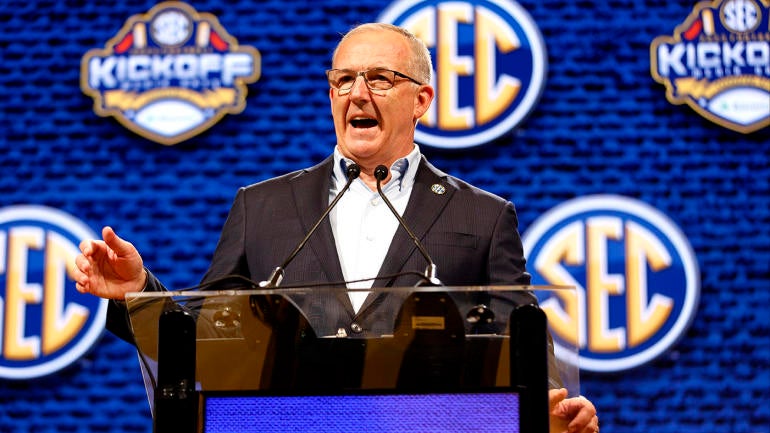
NASHVILLE, Tenn. -- SEC commissioner Greg Sankey is not only the face of college football's most influential conference but is also one of the most powerful voices in college athletics. His opinions matter, and his vision sets the tone for the future. During his annual opening remarks to kick off SEC Media Days on Monday, Sankey addressed the hot-button issues that define this transformative time in the world of college athletics, and especially within his own conference.
The era of name, image and likeness (NIL) allows athletes to capitalize on their success, but one of the most pressing issues that needs to be addressed is structure within the NIL process. Sankey, along with Alabama coach Nick Saban and a host of other college football coaches and administrators, visited Washington D.C. earlier this summer to urge lawmakers for federal legislation governing the process.
"I'm going to be as clear as I can: Our activities in Congress or discussions with states -- and even discussions of conference policies -- are not about taking away these new name, image, and likeness opportunities. In many ways, it's been a net positive for young people," Sankey said. "But we all know there are stories -- some stories told and others not told -- of promises made but not fulfilled, of inducements offered but not provided, of empty commitments of NIL agreements that created more questions than provided answers, and other behaviors in this space that rightly cause concern."
Sankey's speech was geared towards state lawmakers who have not governed their individual NIL laws in a responsible way. Congressional help, Sankey believes, may be the only way. Whether that's a reasonable path, however, remains to be seen.
"If states will not enforce the laws, and states are going to prohibit the NCAA or conferences from enforcing these reasonable policies, Congressional action is then the only way to provide a national uniform standard for name, image, and likeness activity and to draw the lines around the boundaries that do not become simply pay for play," Sankey said.
Realignment carousel slows ... for now
Texas and Oklahoma joining the SEC broke at this very event in 2021, kicking off the first of many conference realignment moves. Two years later, the realignment carousel is spinning far less vigorously. Though that carousel never fully stops, Sankey seems at peace with the conference's immediate future once the Longhorns and Sooners join the fold.
"It's [expansion] not been a topic in the Southeastern Conference other than providing updates, so we're very attentive to what's happening around us, whether those are from all of your fine investigative writing or maybe opinions, and then focusing on our growth to 16 because it's an enormous task," Sankey said. "Do I think it's done? People will say I get to decide that.
"Right now it appears others are going to decide that before we have to make any decisions. My view is we know who we are. We're comfortable as a league. We're focused on our growth to 16. We've restored rivalries. We're geographically contiguous with the right kind of philosophical alignment, and we can stay at that level of super conference."
Ongoing scheduling questions
Related to expansion, finding a permanent scheduling format has been pivotal lately for the SEC. Sankey has been unable to get his schools on board with a full-time scheduling concept after Texas and Oklahoma arrive, forcing a stopgap 1-7 model that gives every team one permanent opponent and seven rotating opponents in 2024. That format, however, has not been solidified beyond next season, and the possibility of a nine-game 3-6 model remains on the table.
"One of the bigger elements was that nonconference game issue," Sankey said. "Now, part of the motivation, I think, going forward is I really think our eight-game schedule is pretty remarkable. Like when we were going through the final filtering you'd say 'Wow, Schedule A is tough,' and then you'd be at Schedule G and you're like, 'That school has got a tough schedule and all the way through.' There are 16 really challenging schedules.
"But there are some important ... we'll call them rivalry games ... and we're going to have to have a decision about do we play those every year or do we play some of them every other year?" Sankey continued. "The eight-game format we can protect one on an annual basis and the other seven rotate. In the nine-game format, we know we can protect up to three, rotate the other six and achieve both that fairness and that balance issue."
















